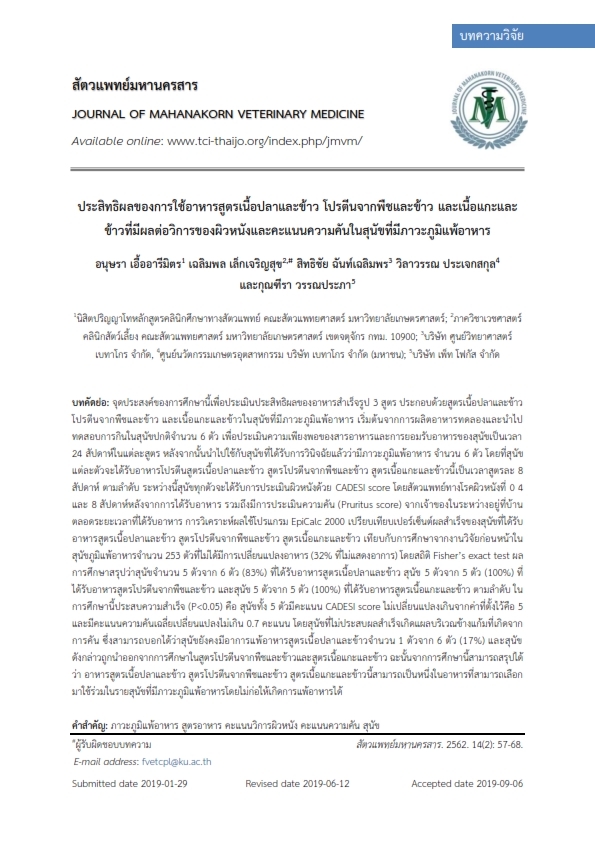Effectiveness of Diet Formulated with Fish and Rice, Plant Protein and Rice, and Lamb and Rice on Skin Lesion and Pruritus Scores in Dogs with Food Allergy
Main Article Content
Abstract
This research aimed to investigate the effectiveness of 3 types of diet formulated with fish and rice, plant protein and rice, or lamb and rice in dogs with food allergy. The study was started with feeding to 6 normal dogs to evaluate the sufficient of nutrients and dog acceptance for 24 weeks in each formulation. After that, the trial used 6 dogs which diagnosed to be food allergy. Every dog in this trial had to be given the food formulated with fish and rice, plant protein and rice, and lamb and rice, respectively for 8 weeks each. At 0, 4 and 8 weeks after feeding, all dogs were evaluated the CADESI score by the dermatologist at the animal hospital. At the same time, the owners were asked to evaluate the pruritus scores at home every day during 8 weeks period. The freeware EpiCalc 2000 was used for statistical analysis with Fisher’s exact test to compare between percentage of successful rate in food allergic dogs given food that formulated with fish and rice, plant protein and rice, or lamb and rice and those that did not change their foods from previous research (81 from 253 dog; 32% of successful rate). The result of this study showed that 5 dogs from 6 dogs (83%) with fish and rice, 5 dogs from 5 dogs (100%) with plant protein and rice, and 5 dogs from 5 dogs (100%) with lamb and rice, respectively were successful to control the skin problem (P<0.05). Five dogs did not have CADESI score change more than 5 points and mean pruritus score did not change more than 0.7 point. Only one dog from six dogs (17%) fed fish and rice formulation was fail in this study. This dog got a wound around cheek caused by itching and dropped out from the next trial of diet formulated with plant protein and rice, and lamb and rice. This indicated the diet formulated from fish and rice could not control allergy in this dog. The accomplishment in 5 dogs with these 3 types of food in this study could suggest that the diet formulated with fish and rice, plant protein and rice, and lamb and rice may be beneficial to dogs with food allergy for alternative choice.
Article Details
References
Buathet K., C. Chanthick, and S. Anaman. 2008. Retrospective study of diagnosis of cutaneous adverse food reaction in 149 pruritic dogs. The Proceedings of the 46th Kasetsart University Annual Conference (Animals and Veterinary Medicine). Kasetsart University in cooperation with Commission of Higher Education, Ministry of Education, Ministry of Agriculture and Cooperatives, Ministry of Science and Technology, Ministry of Natural Resource and Environment, Ministry of Information and Communication Technology, National Research Council of Thailand, and The Thailand Research Fund:359-366.
Davol, P. A. 2001. Allergic and non-allergy food reactions causing skin diseases. Canine Dermatology Series. http:// www.labbies.com/foodreactions.htm
Folador, J. F., K. K. Lilienthal., C. M. Parsons., L. L. Bauer., P. L. Utterback., C. S. Schasteen. P. J. Bechtel, and G. C. Fahey Jr. 2006. Fish meals, fish components, and fish protein hydrolysates as potential ingredients in pet foods. J. Anim. Sci. 84: 2752-2765.
Hilary, A. J. 2009. Food allergy in dogs-clinical signs and diagnosis. EJCAP. 19(3): 230-233.
Olivry, T., R. Mueller, T. Nuttall, C. Favrot, P. Prélaud and International Task Force on Canine Atopic. 2008. Determination of CADESI-03 thresholds for increasing severity levels of canine atopic dermatitis. Vet. Dermatol. 19(3): 115-119.
Ricci, R., H. Bruce., P. Judy., C. Barbara, and J, Hilary. 2010. A comparison of the clinical manifestations of feeding whole and hydrolyzed chicken to dogs with hypersensitivity to the native protein. Vet. Dermatol. 21: 358-366.
Rybníček, J., P. J. Lau-Gillard, R. Harvey, and P. B. Hill. 2009. Further validation of a pruritus severity scale for use in dogs. Vet. Dermatol. 20(2): 115-122.
Shinpei K., J. Isihara, K. Masuda, N. Yasuda, K. Ohmori, M. Sakaguchi, Y. Asami, and H. Tsujimoto. 2010. Clinical efficacy of a novel elimination diet composed of a mixture of amino acids and potatoes in dogs with non-seasonal pruritic dermatitis. J. Vet. Med. Sci. 72(11): 1413-1421.
Verlinden, A., M. Hesta, S. Millet, and G. P. Janssens. 2006. Food allergy in dogs and cats: a review. Crit. Rev. Food Sci. Nutr. 46(3): 259-273.
Zinn, K. E., D. C. Hernot, N. D. Fastinger, L. K. Karr-Lilienthal, P. J. Bechtel, K. S. Swanson, and G. C. Fahey Jr. 2009. Fish Protein substrates can substitute effectively for poultry by-product meal when incorporated in high-quality senior dog diets. J. Anim. Physiol. Anim. Nutr. 93(4): 447-455.


